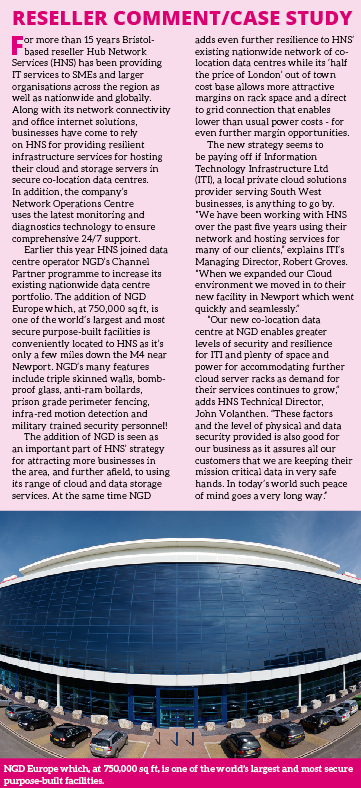
The role of the data centre within the overall communications mix is growing and becoming much more strategic for the channel. As the need for differentiation increases for all channel players up and down the entire supply cycle, we examine the co-location market to see where resellers can ‘join the game’.
There comes a point with many new market trends or developments where the old world needs to recognise that they are being left behind, losing business opportunities and in danger of becoming obsolete.
We saw an example in the UK grocery trade only last month when mainstream (aka expensive) supermarket J Sainsbury decided they could not beat their cheapo competitors and so decided instead to join them by opening 15 stack them high outlets in partnership with Danish outfit Netto. As Tesco would say, ‘Every Lidl Helps’.
 Are we a market that is that price sensitive? Some would say so, and in certain sectors I would agree but in others innovation clearly demands a price premium.
Are we a market that is that price sensitive? Some would say so, and in certain sectors I would agree but in others innovation clearly demands a price premium.
Today the savvy reseller has not only discovered that niche marketing can work but he has also developed his own set of service and applications that can be bundled to make the deal even more profitable and even longer lasting in terms of customer retention. Sweet.
It is in this context that this month we take a look at co-location, a subject that not so long ago would have been regarded as an alien territory for resellers to step into as Randall Smedley, Sales Manager at Viatel, explains.
“The humble co-location rack has changed very little over the last 20 years. Conversely, the equipment housed within it has changed enormously. The standard 19” rack has witnessed the evolution of the ICT Industry from simple server hosting all the way through to the latest, highly available, complete cloud solution.
So if the co-location rack itself is pretty standard, why then do the charges for co-location services vary so much from one data centre provider to another and how does the partner community decide what is best for them and their customers?”
I promise this is not another Tesco moment so let’s explore that a little with Mr Smedley.
“One of the obvious first questions is what tier of data centre to go for? No one wants to see their rack go dark because of a power failure and so the tier of data centre you choose will determine just what the likelihood is of this type of event happening. If you are running mission critical applications on a global scale that really have to be up 100% of the time, all day every day, then you might want to consider a tier 3 data centre or above, but you will pay handsomely for it. On the flip side, if you are running back-up services or non-critical applications, why pay the premium of a tier 3 co-location rack? If you are not an expert in this field, (and if it’s not your core business why would you be?), then how do you decide?
Having been a data centre and connectivity provider to the partner channel for over 10 years now, Viatel understands exactly the questions that go through a partner’s head when considering co-location and we believe we have the answers that allow a partner to make a fully informed decision.
Our dedicated Partner Account Managers work closely with their partners to educate and enlighten them on the pros and cons of co-location. We explain clearly the associated benefits of ‘in town’ or ‘out of town’ data centres, what to consider when looking at co-locating equipment or applications, and we couple this with a simple to understand, competitive pricing structure that enables the partner to successfully sell onwards to their clients and customers.”
Paul Bryce, Business Development Director at Node4, has witnessed over the last few years more and more customers realising the value in ‘hosted’ services.
“Rather than contacting their trusted technology supplier with a defined requirement, customers are saying they want a particular service or application at a monthly price with a Service Level Agreement (SLA).
Co-location is one such hosted service that offers users significant benefits by providing space and power for hosting customer owned equipment in a secure, resilient facility. By managing all of these elements for partners, co-location vendors can offer businesses significant cost savings compared to managing an in-house data centre, which involves the high entry to market costs associated with hardware and resiliency.
However, choosing a hosting partner, whether for co-location or any other service, is a major decision to undertake. Resellers must be sure that a potential partner has the right technical specification to match its infrastructure needs. This goes beyond the standard power and connectivity specifications and means drilling deeper into the specifications that underpin the services you will use. Furthermore, your partner’s service levels must match up to your own, especially if the team is likely to be meeting customers and supporting installations and maintenance. Your co-location partner should provide an on-site support team to ensure customers have expert support whenever they need it – ideally 24/7.
Hosted services are about far more than storage though. Resellers should always be looking to work with partners that support additional services to the ones you currently provide. For example, a data centre partner can provide Cloud infrastructure, which can be used separately or in addition to co-location. Perhaps you need a virtual server to run a call centre or billing application. We see a lot of growth opportunity in a more bespoke approach where customers have both co-location and Cloud requirements. It can also allow resellers to start offering services such as data backup – a simple value-add service.
Finally, confirm that your Data Centre partner owns and controls its infrastructure. This will give you more flexibility and valuable insight over its variety of solutions, ensuring that you get the exact services you want without being restricted to pre-determined packages.
Activity Explosion
Nikki Potter, Cloud and Hosting Product Manager at Daisy Group, observes that the on-going commoditisation of computing, in the transformation from a product to a utility service, has lowered the barriers to innovation and enabled an explosion of new activity in digital engagement, web, social and mobile.
“This new cloud-native world looks very different in terms of architecture and practices, when compared to the client-server era of the last two decades. The previous era focused on the automation of paper-based transactional processes, but now the concentration has shifted to new business value and systems of engagement.”
So how does this affect the data centre?
Potter says today’s data centres must continue to deliver the traditional line of business applications on which most businesses still depend, but they must do this with increasing efficiency.
“The hosting of private environments will also be a market opportunity in the short-to-medium term, where we will need to reconcile the worlds of private clouds and public hyper-scale clouds.
The distinction between the old and new style of IT is well understood by the IT analyst industry and we experience it every day at work, with the stark contrast between our back office IT systems and the consumer apps running on the smart devices in our pockets. The key now is making customers aware of the changing data centre and the benefits of its offerings.
 At Daisy, we have four data centres located across the UK as we believe accessibility is vital for any business that chooses to co-locate. They need to be reassured that their data can be accessed 24/7, 365 days of the year, so in addition to physical locality, it is also important to have measures in place so that data can be retrieved quickly in business-critical circumstances.
At Daisy, we have four data centres located across the UK as we believe accessibility is vital for any business that chooses to co-locate. They need to be reassured that their data can be accessed 24/7, 365 days of the year, so in addition to physical locality, it is also important to have measures in place so that data can be retrieved quickly in business-critical circumstances.
Co-location is a stepping-stone into cloud type services whereby a customer can underpin their server infrastructure with a communication strategy and data centre at the core.
There’s no doubt that more businesses are beginning to realise the benefits of co-location, particularly in regards to time and money as a result of the utilisation of shared data centre infrastructure, technology and human resources. In addition to the obvious benefits of increased security and protected data from both physical and malicious attacks, there is also a lot to be gained from freed up resources and time, meaning concentration can shift to core business operations.”
According to Potter security is paramount; co-location providers should be able to offer ISO27001 accreditation and a minimum of 99% Service Level Agreement on network, power and servers. This has become a standard level of expectancy in the industry and organisations are facing an increasing pressure to meet government, industry and boardroom regulations.
Potter concludes, “As competition in the co-location market grows, it’s important that resellers can offer additional resources. For example, at Daisy we offer a range of packages to best suit the services required by each business, rather than a ‘one size fits all’ approach. However, with each package we also offer firewall and load balancing capabilities for added value and heightened peace of mind. This service wrap places resellers in a much more competitive position with the ability to appropriately cater to the SME market.
At Daisy we will continue to focus on innovation. We have a team specifically focused on new products, services and next generation technology. Using our extensive supplier relationships, we are able to monitor market developments with a view to implement and develop new products and services in order to create a future-proof solution.”
Ed Says…
Daisy sum it up for me when they say ‘As competition in the co-location market grows, it’s important that resellers can offer additional resources’. Resellers need to develop bundles of services for their end users in order to differentiate and one way is to find a partner that can help kick start that process – then customise that offering further themselves.
